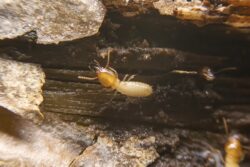There are two types of termites all Florida residents should be aware of, subterranean and drywood termites. While each species has different characteristics and preferences, both can cause considerable damage to homes, causing thousands of dollars in repairs. Understanding termite characteristics and signs can help homeowners prevent and avoid a termite infestation.
Subterranean Termites
Subterranean termites need moisture to survive, living in underground colonies or in moist areas above ground. These termites will build tunnels, often called “mud tubes” that allow them to gain access to food sources. These pests use their saw-toothed jaws to bite off small wood fragments, creating damage to baseboards, foundations, floors, doors, and windows.
A common subterranean termite sign is seeing mud tubes, which look like long tunnels made of wood and soil. You can also suspect a termite infestation if you hear a hollow sound after tapping on wood or notice bubbling paint.
Drywood Termites
Drywood termites thrive in environments containing hard, dry wood. These pests can cause damage when they excavate wood to create their colonies. While these termites need little moisture to survive, they can also be found in wood near a water source like a leaky pipe or water heater. Most of the time, you can find these termites in attic framing or secondhand furniture.
It can be difficult to spot drywood termites since they live in wood, but common signs include spotting discarded wings near a light source or their droppings or frass, which look like tiny pellets.
Preventing subterranean and drywood termites can seem like a daunting task, but it is possible. Consider utilizing these prevention tips to avoid termites infesting your home,
- Repair any leaks from faucets, pipes, or air conditioners.
- Divert water away from your home with spouts, splash blocks, and gutters.
- Make sure there’s at least an 18” gap between the soil and wood portions of your home.
- Keep firewood stored at least 20 feet away from your home and elevated off the ground.
- Avoid utilizing mulch for landscaping and instead, try using rocks or gravel.
- Reach out to your local pest control company to schedule an annual termite inspection to help detect termite problems early before an infestation occurs.



